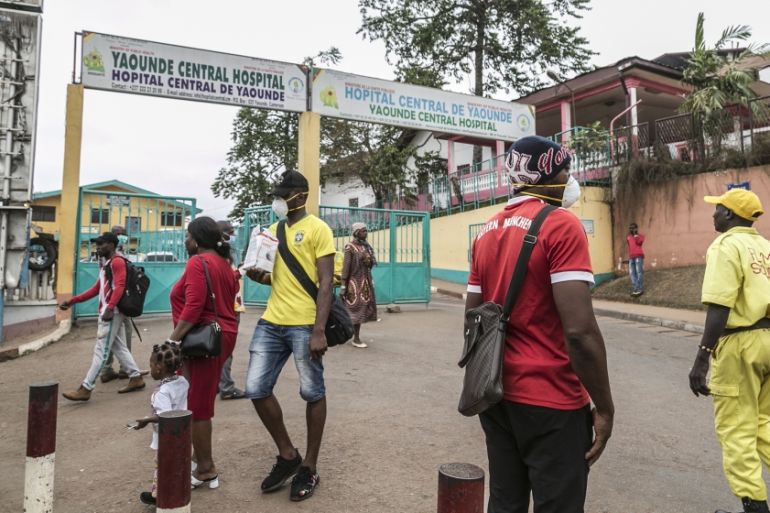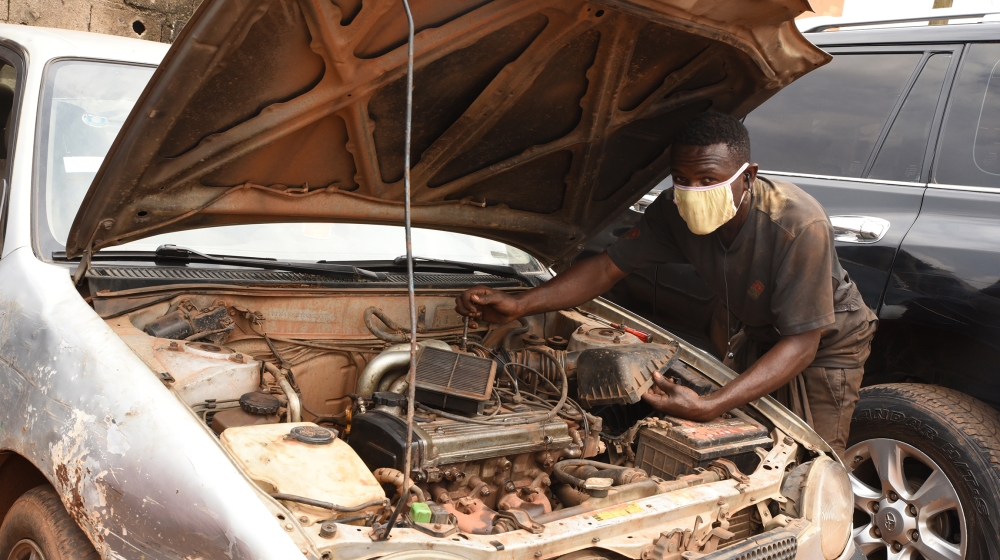Masks, bans and questions: Inside Cameroon’s COVID-19 response
President Biya has not addressed nation in weeks, raising questions, but gov’t has taken series of steps to stem virus.

For more than a week now, Frankie Manghen never steps out of his home without putting on a face mask.
“I wear it every day because I fear contracting COVID-19,” says the 25-year-old auto mechanic in Cameroon‘s capital, Yaounde.
Keep reading
list of 3 items‘No country will be spared’ in sub-Saharan Africa: IMF
Afro-jazz legend Manu Dibango dies after contracting coronavirus
From April 13, the government made it obligatory for people to wear face masks whenever appearing in public as part of measures to slow the spread of the coronavirus pandemic.
Along with concerns about catching the “dreadful” COVID-19 disease, Manghen says he is totally unprepared to pay any fines for not wearing the face-covering gear. But with the price of masks rising four- to eight-fold following the government order, now costing as much as 1,000 XAF ($1.6), he cannot afford the disposable items sold in pharmacies. Instead, he recently bought two locally-made reusable masks from street hawkers.
“Masks are compulsory but many Cameroonians whose businesses are already affected by the spread of COVID-19 say they cannot afford these masks regularly,” says Nkongho Felix Agbor, a human rights lawyer.
Agbor’s organisation, the Center for Human Rights and Democracy in Africa (CHRDA), has stepped in to distribute thousands of masks for free and provide hand-washing points in several communities amid efforts to educate the public about the danger of the coronavirus.
“So far, we have produced 3,500 masks [but], even more important, is the free awareness and sensitisation campaigns that we carry out.”
Cameroon reported its first confirmed case of COVID-19 on March 6, and the number has now jumped to 1,163, according to the Africa Centres for Disease Control and Prevention. Some 329 patients have recovered, and 43 have died.
The government has rolled out a series of coronavirus containment measures, including shutting all borders on March 18. Public and private schools have also been ordered to halt operations while public gatherings of more than 50 people have been banned, as has non-essential urban and inter-urban travel within the country.
Bars, restaurants and entertainment spots are not allowed to operate after 6pm, while commercial bus, taxi and motorbike drivers have been warned to avoid overloading.
The government has also said private health facilities, hotels, vehicles and other equipment could be requisitioned to fight the pandemic.

There are about 15 COVID-19 testing centres in eight of Cameroon’s 10 semi-autonomous regions, according to the Ministry of Public Health (MINSANTE). Meanwhile, a toll-free number has been established for the public to mobilise rescue teams.
Patrick Mbah Okwen, a district medical officer in the North-West Region of Cameroon, described the health response as “satisfactory”, citing “the government’s experience with pandemics and epidemics in the past”.
Okwen said the government organised training and promptly issued guidelines on case management to primary healthcare facilities.
“Existing gaps in the health systems cannot be overlooked,” he admitted, noting that challenges related to mass testing, the caring for critically ill patients and the protection of healthcare workers need to be addressed.
Some, though, have criticised the government’s handling of the outbreak.
Kah Walla, president of the opposition Cameroon People’s Party (CPP), called its response “late, weak, incomplete and poorly executed”, alleging delays with closing the borders and expanding large-scale deployment of vital equipment such as test kits, masks and ventilators.
Walla also argued the country lacked a thought-out plan to support displaced people and promote physical distancing in markets, worship centres and social gatherings.
“As a result, the population is not taking the threat seriously and other actors from civil society and private sector – who have not been consulted by government – have no idea how to orient their actions and contributions to the fight,” she said.
Al Jazeera contacted the public health ministry as well as the head of the communication at the ministry for comment but did not receive a response by the time of publication.
#LetsFindBiya
Meanwhile, nothing has caused as much furore online – especially among opposition politicians and activists – as the public absence of President Paul Biya.
The 87-year-old, who is the oldest leader in Africa, has not addressed the nation since the emergence of the first case early last month, prompting some on Twitter to use the hashtag #LetsFindBiya.
Then, on April 16, Biya’s official Twitter account posted a picture of a meeting with Christophe Guilhou, France’s ambassador to Cameroon, to discuss the fight against COVID-19. Guilhou retweeted the image.
🇨🇲🇫🇷 Je viens de recevoir au Palais de l’Unité, l’Ambassadeur de France au Cameroun, Christophe Guilhou. Au menu de notre échange de cet après-midi: la gestion de la pandémie COVID-19 au Cameroun, en France et dans le monde.#PaulBiya#COVID19#Covid19Cmr#Cameroun pic.twitter.com/5jN7T8Bovt
— President Paul BIYA (@PR_Paul_BIYA) April 16, 2020
The tweet came a day after Maurice Kamto, an influential opposition politician who challenged Biya in a 2018 presidential election, took to social media to ask parliament to declare a power vacancy at the presidency and organise a new election over Biya’s “prolonged and unexplained absence”.
Kamto, who was released from jail in October last year after insurrection charges against him were dropped, had already issued a seven-day ultimatum on March 27, requesting Biya to address the nation and outline the government’s response and necessary funding for businesses and households. Biya did not respond to that demand.
The head of state has a reputation for embarking on frequent personal trips abroad. A 2018 investigation published by the Organised Crime and Corruption Reporting Project found that Biya spent about four and a half years on “brief private visits” in the past 35 years.
Since the onset of the outbreak, most of the official communication has been coming mostly from Prime Minister Joseph Ngute and Malachie Manaouda, the minister of public health. But in recent days, journalists say that official updates have stopped being detailed and often come late.
“It is now hard for journalists to get timely and detailed updates,” said a reporter with a foreign broadcaster. “The updates now are mostly on recovery and hospitalised cases and deaths.”
Okwen, the district medical officer, who was complimentary about the government’s response on the health front, was critical of the initial handling by some leading politicians.
“The political response … was a mess,” he said. “The MINSANTE actually recommended face-covering before WHO. It also made other recommendations, including 14 days’ isolation for any people entering the country – but we all helplessly watched as top politicians ignored these recommendations.”

Meanwhile, Biya signed a decree on April 15 to reduce and remit the sentences of some prisoners, except for fugitives, recidivist offenders, and people sentenced for several offences related to terrorism, tax fraud, torture, rape and sexual assault.
The move came in the wake of widespread warnings, including from Human Rights Watch, that overcrowded prisons might become hotspots for the pandemic.
While the government has not revealed any specific names or numbers about the prisoners released or those whose sentences will be reduced, it is believed the decree excludes suspected Anglophone separatists and activists who have been sentenced on terror-related charges during a three-year crisis in Cameroon’s North-West and South-West regions.
Conflict between security forces and fighters seeking to create a breakaway state called Ambazonia has displaced more than 700,000 people in the two regions, with about 60,000 crossing the border to Nigeria since late 2017.
Walla, of the CPP, complained that the president’s decree to reduce jail terms ignores repeated calls to “decarcerate and release prisoners who are awaiting trial, political prisoners and those convicted of misdemeanours”.
“This measure,” she said of the decree, “targets a very small number of prisoners and keeps the thousands in Cameroon’s prisons vulnerable to COVID-19.”
Comfort Mussa reported from Yaounde, Cameroon and Linus Unah reported from Abuja, Nigeria